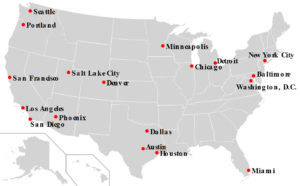One of the many consequences of the latest U.S. presidential election has been a renewed movement seeking to declare various communities across the country as “sanctuary cities.” But what does that mean?
Surprisingly, there is no official legal definition for what constitutes a “sanctuary city.” This expression usually refers to U.S. cities whose local governments have adopted a policy of non-cooperation with federal authorities in the enforcement of immigration laws. These policies are sometimes formal, such as a city ordinance, and other times informal, such as a resolution or declaration. 
Often, it involves instructing local law enforcement to not ask individuals about their immigration status. Other “sanctuary cities” go a step further, and command local law enforcement to refuse (when requested by federal authorities) to detain undocumented immigrants who are not suspected of committing a crime.
A few complications exist. First, immigration laws are federal laws, and their enforcement is solely within the scope of federal immigration authorities. So whether or not local authorities are willing to “cooperate,” sanctuary cities certainly cannot “prevent” or “stop” the feds from enforcing immigration laws if they choose to do so.
At the same time, because U.S. immigration laws are so complex, it is fair to assume that local and state law enforcement personnel are simply not qualified to unilaterally determine whether an individual is in the U.S. legally or without documentation. From that perspective, adopting a local policy of “staying out of immigration matters” may be a sensible step; local governments strapped for funding arguably should not be detaining anyone without probable cause to believe that the individual committed a crime.
Which brings an important point: because immigration laws are civil in nature, a person’s mere unlawful presence in the United States without proper documentation is NOT a crime but rather a civil violation. There is limited need for a community to declare itself a “sanctuary city” if local law enforcement is following the U.S. Constitution, and not detaining people without probable cause.
Declaring itself a “sanctuary city” may also have the unintended effect of attracting greater attention from federal authorities, as it implies that each such city has a large undocumented population. And, unfortunately, it is too easy to imagine over-zealous U.S. citizens who may take it upon themselves to begin reporting “suspicious” individuals, which would probably translate into racial stereotyping and targeting of persons simply because of how they look.
Interesting times, we live in.
